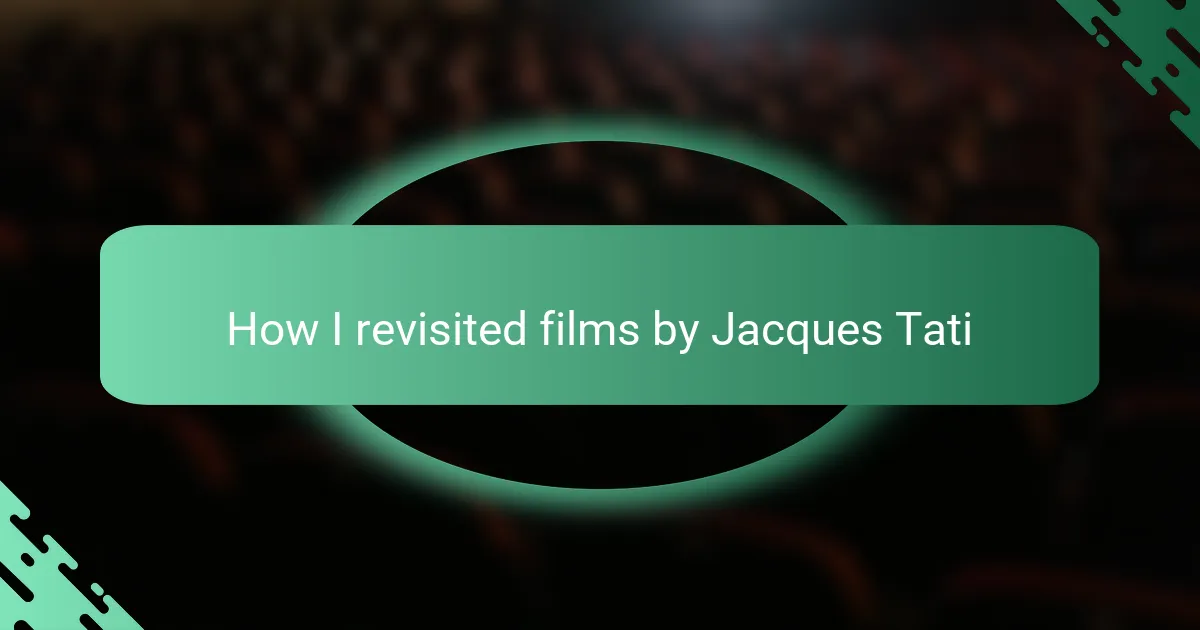Key takeaways
- Jacques Tati’s films, particularly featuring Monsieur Hulot, blend visual comedy with social commentary, highlighting the contrast between modernity and tradition.
- Tati excels in using sound and silence to enhance storytelling, inviting deeper observation of the mundane aspects of life.
- His influence on cinema endures, inspiring filmmakers to prioritize visual humor over dialogue while crafting intricate, emotionally resonant environments.
- Key themes in Tati’s work, such as human interaction and isolation, prompt reflection on personal experiences and the impact of technology on daily life.

Overview of Jacques Tati films
Jacques Tati’s films are a delightful exploration of human nature through visual comedy and whimsical storytelling. I remember the first time I watched “Mon Oncle”; I was struck by Tati’s ability to convey so much emotion without uttering a word. The charming protagonist, Monsieur Hulot, highlights the contrast between the modern world and simpler living, which resonates on a personal level, reminding me of my childhood in a less complicated time.
Tati’s unique style combines physical comedy with elaborate set designs, making each frame a visual treat. His films capture the essence of mid-20th century French culture, inviting viewers to reflect on the absurdities of everyday life. Here are some key aspects of Tati’s work:
- Inventive use of sound and silence.
- Iconic character of Monsieur Hulot, who embodies the everyman.
- Satirical take on modernity and technology.
- Masterful visual gags and physical humor.
- Richly detailed and vibrant settings that enhance storytelling.

Key themes in Tati’s work
Jacques Tati’s films are brimming with themes that resonate deeply, elevating them beyond mere entertainment. One of the most striking themes is the juxtaposition of technology and tradition. I remember watching “Mon Oncle” and feeling a mix of nostalgia and intrigue as Tati showcased the clash between modern machinery and old-fashioned ways of living. It’s a beautiful reminder of how technology can enhance life but also create distance.
Another prominent theme is the exploration of human interaction and isolation. Tati masterfully portrayed characters navigating a world that often feels overwhelming and alien. In “Playtime,” I was captivated by the choreography of people in busy urban spaces, all seemingly disconnected despite being surrounded by each other. The humor in these moments underscores the absurdity of modern life, making me reflect on my own experiences of feeling lost in a crowd.
Lastly, Tati has an extraordinary talent for visual storytelling without relying heavily on dialogue. His playful use of sound and silence adds layers to scenes. In “Traffic,” I found myself laughing out loud at the comedic timing achieved through visual gags alone. Tati’s ability to communicate so much with so little is something I aspire to in my projects.
| Theme | Example Film |
|---|---|
| Technology vs. Tradition | Mon Oncle |
| Human Interaction and Isolation | Playtime |
| Visual Storytelling | Traffic |

Influence of Tati on cinema
Tati’s influence on cinema is profound and far-reaching, resonating with directors and audiences alike. I recall watching films by contemporary filmmakers who clearly draw inspiration from Tati’s inventive approach. His unique blend of visual humor and social commentary invites filmmakers to explore storytelling without relying heavily on dialogue, pushing the boundaries of traditional narrative forms.
One of the most significant impacts of Tati’s work is the way he emphasized the importance of the physical environment in storytelling. For instance, every scene in “Playtime” serves as a character in its own right, reflecting the complexities of modern life. As I imagined wandering through his meticulously crafted worlds, I realized how much these settings can shape our emotions and perceptions, something that many directors today still strive to emulate.
Tati has also paved the way for a new generation of visual comedians who prioritize sight gags and physicality over spoken words. I often find myself laughing at films that echo his humor, marveling at how they capture simple moments of life in such an engaging way. This influence is a testament to Tati’s artistry, proving that sometimes, the simplest visual can convey the most profound message.

Personal reflections on Tati films
Jacques Tati’s films have a unique way of capturing the essence of everyday life, making me reflect on my own experiences. When I watched “Mon Oncle,” I found myself chuckling at the contrast between traditional and modern influences, reminiscent of my own childhood visits to my grandparents’ old home, where time felt frozen amidst the encroaching modernity of suburbia. It’s fascinating how Tati weaves humor and nostalgia seamlessly, evoking emotions that linger long after the credits roll.
Revisiting Tati’s works, I’m often struck by their timelessness. The visual gags and expressive storytelling not only highlight the humor but also invite deeper contemplation about the human experience. I realized this while rewatching “Playtime,” as I processed how technology often overshadows genuine connections in our lives. It’s a beautiful reminder to savor the simplicity around us.
- Tati’s attention to detail reveals the humor in mundane activities, reminiscent of my trips to bustling city markets.
- His films often reflect the tension between progress and tradition, which resonates with my own family dynamics.
- Each viewing unveils new layers, sparking conversations about modern living and the art of communication.
- The absence of dialogue emphasizes the importance of visual storytelling, which I find both refreshing and illuminating.
- Tati’s characters often embody innocence and curiosity, traits that remind me of my own exploration of the world as a child.

Memorable scenes in Tati’s films
When I think of Jacques Tati’s films, I can’t help but recall the delightful chaos woven into each scene. One unforgettable moment is from “Playtime,” where Tati’s character, Monsieur Hulot, navigates the vast, sterile office space, encountering the confusion of modernity—it’s both humorous and eye-opening. It strikes a chord with anyone who has felt lost in the bustle of contemporary life, reminding us of the beauty and absurdity that surrounds us.
Another standout scene occurs in “Mon Oncle,” where Hulot visits his sister’s ultra-modern home. The juxtaposition of his whimsical, clumsy nature against the sterile, robotic efficiency of her lifestyle creates a poignant commentary on progress. It’s a reminder that sometimes, the simplest things—like the joy of a butterfly flitting around a garden—bring more happiness than the latest gadgets.
- The opening scene in “Playtime,” where the sheer scale and design of the new Paris act almost as a character in itself.
- The endearing moment in “Jour de Fête” where Hulot gets distracted by the town’s fair, showcasing his innocence and charm.
- Monsieur Hulot’s iconic running gag of missing his bus in “Traffic,” brilliantly illustrating the unending hustle of life.
- The charming interactions with children in “Mon Oncle,” which highlight the contrast between adulthood and childlike wonder.
- The artful use of sound in Tati’s films, particularly in “Mr. Hulot’s Holiday,” where ambient noises enrich the comedic effect rather than relying solely on dialogue.

Lessons learned from revisiting Tati
When I revisited Jacques Tati’s films, I was struck by the timelessness of his humor and the depth of his social commentary. The way he critiques modern society through his character Monsieur Hulot resonates even more today, illustrating how technology often complicates life rather than simplifying it. I found myself laughing at his visual gags while also reflecting on the way we navigate our own busy worlds.
One lesson that stood out to me was Tati’s ability to convey complex ideas through simplicity and visual storytelling. I remember the sheer joy of watching “Playtime,” where each scene is a vibrant tapestry of everyday life, bursting with detail and nuance. It reminded me that sometimes, the most profound messages come from observing the mundane with a fresh perspective.
Another key takeaway is Tati’s brilliant use of sound and silence. His films encourage us to pay attention to our surroundings in a new light. After experiencing this, I realized just how often I overlook the subtle sounds and sights that enrich our daily lives.
| Aspect | Jacques Tati’s Films |
|---|---|
| Humor | Timeless and visual, transcending language barriers |
| Social Commentary | Critiques modernity and technology’s impact on life |
| Storytelling Style | Simple yet profound, focusing on the beauty of the mundane |
| Use of Sound | Enhances the visual experience, prompts deeper observation |

Recommendations for Tati newcomers
If you’re new to Jacques Tati, I highly recommend starting with “Mon Oncle.” It’s a film that effortlessly combines humor with heart, showcasing the charm of Monsieur Hulot as he navigates a world filled with absurdities. I recall my first viewing and how it resonated with my own experiences of simpler times. It’s a delightful introduction to Tati’s visual storytelling and his critique of modernity.
Another film to consider is “Playtime,” where the breathtaking set design serves almost as a character itself. I remember getting lost in the bustling office scenes, reflecting on how technology creates both wonder and confusion. Have you ever felt overwhelmed by the fast pace of modern life? Tati captures that sentiment perfectly, encouraging us to appreciate the smaller, often overlooked details in our surroundings.
Lastly, don’t miss “Traffic.” It’s a humorous commentary on the chaos of life, and its visual gags sparked joy in me all over again. Each scene invites us to laugh at ourselves and our daily struggles. I find that every revisit of this film teaches me something new, and it certainly reinforces Tati’s mastery of communicating profound messages through visual comedy.
